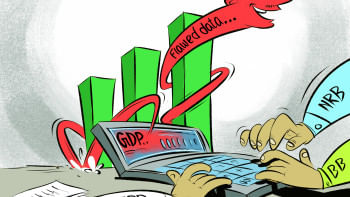No relief for consumers as inflation hits 12-year high

The government's inability to keep annual inflation anywhere near its target of 7.5 percent is deeply concerning. As reported by this daily, the annual average inflation has surged to 9.73 percent in the just-concluded fiscal year, according to Bangladesh Bureau of Statistics (BBS). This is the highest inflation experienced in 12 years since 2011-2012, when annual inflation was 10.62 percent. What is even more concerning is that this is the second consecutive year that the Consumer Prices Index has stood at more than 9 percent. This means that the tremendous inflationary pressure experienced by citizens has actually persisted for two straight years.
The resulting erosion of people's real income and the deterioration of their living standards—particularly of low-income groups—are there for all to see. According to an earlier survey by the South Asian Network on Economic Modelling (SANEM), as many as 70 percent of the households in Bangladesh had to change their food habits involuntarily to cope with rising prices. It further discovered that food insecurity among the poor had increased drastically, meaning that the prospect of malnutrition and various health concerns has also risen considerably. Despite such warnings, the fact that the government has failed to bring inflation down by now is completely unacceptable. True, there have been some measures to address it, but those were taken too late, and because of the "time lag effect," we are yet to see them really kick in.
The good news is that some of those measures may eventually pay dividends down the line. However, as experts have said, the government needs to do more. For starters, perhaps it should increase the interest rate further to tame inflation. Moreover, its failure to properly regulate the market means that a section of business groups is continuing to artificially prop up prices. These businesses, unfortunately, are either politically connected, or have acquired monopoly powers due to failed government policies, which makes holding them accountable difficult. But that is exactly what the government must do, without exception.
So, while its focus—although late—has so far been on demand containment, now it must also shift to addressing the distortions in the market and the problems in supply chain. And these issues have persisted in our country for years and have somewhat become entrenched. Despite that, the government needs to take a holistic approach to finally fix them. Parallel to that, it must ramp up its support for lower-income groups. That should include its rice distribution programme, as well as selling essential food items at subsidised rates to low-income earners.


 For all latest news, follow The Daily Star's Google News channel.
For all latest news, follow The Daily Star's Google News channel. 










Comments